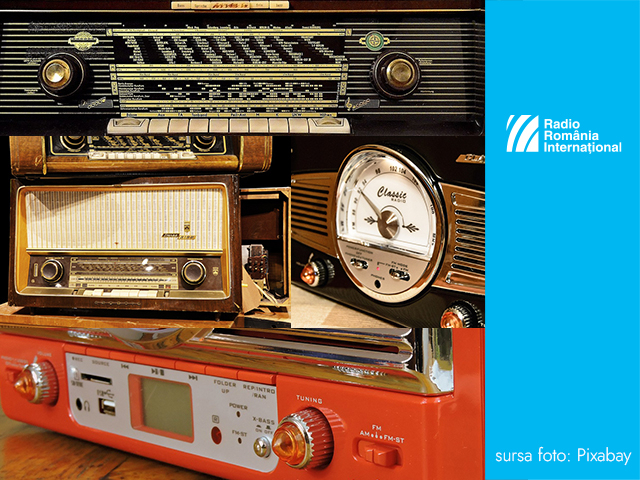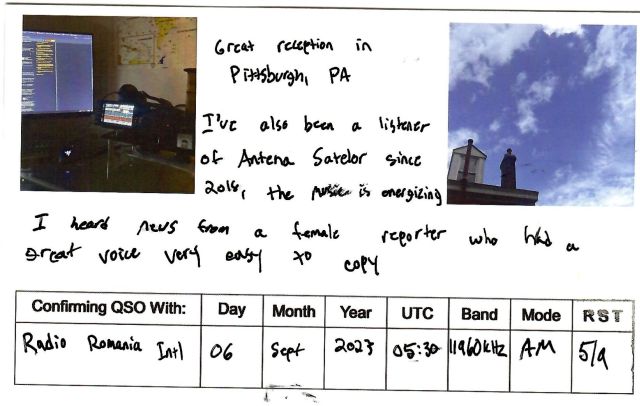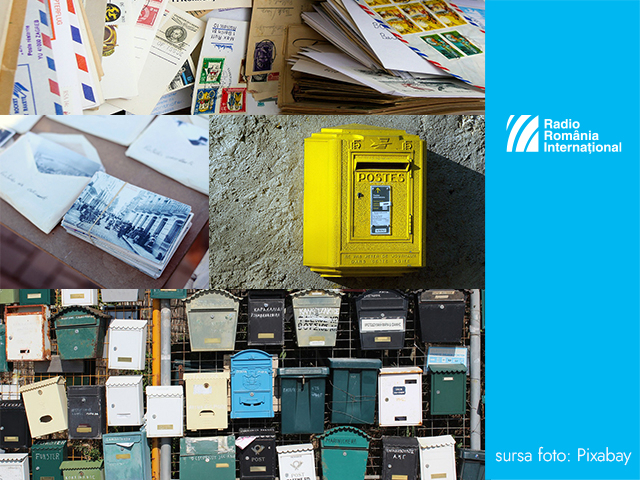Mail Roundup – October 27, 2023
A roundup of messages we've received in the last two weeks

Vlad Palcu, 27.10.2023, 11:16
Hello, guys,
Another two
weeks have passed and October is almost at an end. We’d like to thank everyone
who’s supported us in these difficult times. Unfortunately, the two
transmitters will most likely remain discontinued. The wave of solidarity
you’ve shown has been overwhelming, and we’d like to express our gratitude for
all the messages of support we’ve received at our station – they really keep us
going!
On yet another
disconcerting note, our Gmail address – engl.rri@gmail.com
has been discontinued. We encourage everyone to write to us exclusively to our
standard email address, engl@rri.ro, for
regular reception reports and feedback, comments and other suggestions. Please
don’t use any other Gmail address! (We may use our recovery mail to respond,
but use our standard address instead).
***
Listener’s Day on RRI 2023
You are still
invited to contribute to our special Listener’s Day programme, which will be
aired on November 5th. This year we’re asking you how has climate
change affected your lifestyle and how can each of us contribute to reduce our
carbon footprint and help tackle these effects more efficiently. See the full
call for contributions in the link below:
https://www.rri.ro/en_gb/listeners_day_on_rri_call_for_contributions-2691768
***
Listeners of RRI
– your profiles
We also invite
everyone who hasn’t already contributed to our new online section to send
information about technical equipment used for listening, listening habits and
preferences in addition to some background data, to be included in our
Listeners of RRI special profiles. You can check them out on our website, while
the call for contributions is available in the link below:
https://www.rri.ro/en_gb/listeners_of_rri_call_for_contributions-2688058
***
In October we
also got a message from Charles Bialet, who lives in Brazil:
Hello from the city of Nova Friburgo,
mountainous region of Rio de Janeiro – Brazil. It is a great pleasure for me to
receive notices or news from you. Romania, how fantastic! I would love to be in
the city where you are. I would love to not be in Brazil and have a new life! I
continue listening to shortwaves and would like to know updated information
about times and frequencies that they transmit and that I can listen to them
here in Brazil. If you have any photographs of the radio, of you, or of the
team, I would love to receive them. I am 62 years old and since I was 8 years
old I learned from my late father to love listening to shortwave broadcasters
and I continue to this day and currently use a Tecsun PL660 radio and a Tecsun
S2000 when listening.
I use Google
Translator and I apologize if the English is not written well. I speak and
write well in Portuguese and Spanish. I can read the English language
reasonably well, but due to lack of practice I don’t speak it well, but I
understand a lot of what I hear. A big hug to you and your broadcast
colleagues.
Our heartfelt
regards and wishes to you as well, Charles, it was great to reconnect after
such a long break.
***
Paul Capewell
(United Kingdom), also got in touch with us after a long break, adding at the
end of a reception report:
The programming
today was, as it always is, very interesting and varied, giving the world an
insight into local and world vents through a Romanian lens. The mixture of
local music is always especially interesting, hearing rock and folk and just
artists I would never hear anywhere else.
As others said
on the mailbag section, I was sad to hear of the recent cuts to the budget
which have cut back on your transmissions, and I wanted to tell you how much I
enjoy hearing Romanian music, news and history directly from Romania via radio
over these thousands of miles that separate our two nations. I hope the
shortwave service will continue for a long time yet.
Thanks, Paul,
for your support. We too hope we will continue SW broadcasting for as long as
possible.
***
This week we got a number of letters sent
through regular mail to our post office address. Here is the list below:
Nicholas
Nowak, USA
He actually enclosed a beautiful QSO, which
we’ve scanned and reproduced below.
Thanks so much for sending these wonderful
custom-made cards, Nicholas. They sure make our day.


Robert
Wallace, UK
Robert sent us a number of reception
reports (in A5 format!) and comments at the end:
I greatly enjoyed listening to Society
Today and the story of the Romanian photographer exploring picturesque
villages, landscapes and people. And how the ethnographic photographer takes
refuge in the hills, with nature. Taking photographs of traditional people and
places in deep Romania. I found the episode heartwarming and it reminded me of
how life would have been here in Northern Ireland 100 years ago.
Hidemitsu Miyake, Japan
We actually received a report for August
from our Japanese listener, who writes:
To my surprise today’s temperature is over
35 degrees Celsius. How hot does it
get at the hottest time in your town?
August is the hottest
month, I can’t take the heat. This heat makes me lose
my appetite.
We celebrate various summer festivals.
There’s a fireworks display tonight. I love fireworks because they are so
pretty. What holidays do you have in August in your country
Well, Hidemitsu, our response is belated :)
August is the hottest month in Romania as well, although this year the highest
temperatures were report in July.
In August we have a major holiday related
to the Orthodox calendar – the Assumption of the Blessed Virgin Mary. Millions
of Romanians called Maria or Marian celebrate their name day on that occasion.
Stay safe!

A word of thanks also to P.R. Newton and
Paul Rudd, both from the UK, for sending their reports.
***
In the wake of
the conflict in the Middle East, we got a number of messages calling for unity,
peace and solidarity in these trying times. One such message was sent by Muhammad
Aqeel Bashir (Pakistan):
It is with a
heavy heart that I turn to you to express my deep sadness over the recent
conflict between Hamas and Israel. This conflict has resulted in an
immeasurable loss of life and it pains us deeply to see innocent children
martyred and to experience the loss of loved ones on both sides.
In this time of
pain and sadness, I would like to prayer for creating an atmosphere of
brotherhood and love. May my prayer touch people’s hearts and anchor the roots
of peace and reconciliation deep in our societies. Let us remember together
that we are all human beings, regardless of our origins, religion or
nationality, and that the loss of a human life on either side is a loss for all
humanity.
In this dark
time, we want to bring light and hope by advocating for peace and unity. Let us
pray and work together to ensure that such conflicts never overshadow our lives
again.
***
Our listener
from India, Bidhan Chandra Sanyal, has once again written to inform us about
the start of a major Bengali festival, Durga Puja. More details in his message
below:
The best
Bengali festival Durga Puja has started.
Heartfelt love and best wishes to all of you on the occasion of Durga
Puja.
Durgatsava is
the best festival of Bengali, bridging the gap between the rich and the poor,
caste differences and bringing everyone together irrespective of caste and
religion to engage each other in joy.
Puja and Upasan
means the attempt to move forward in life by relying on God. Worshiping and adoring God as a mother is a
unique feature of traditional Bengali culture.
According to
mythology, the gods are asleep in the Dakshinayana of the Sun, awake in the
Uttarayana. In autumn it is the turn of
the gods to rest. Sri Ramachandra
awakened and worshiped Goddess Durga while she rested to kill the evil Ravana,
the opening ritual of Durga Puja is hence known as Akal Bodhana. In continuation of that, the practice of
Durga Puja in autumn.
Atpaur of
Bengali overcomes the disappointment, failure and disaster of not getting
thousands in the world, from Mahalaya to Dasami’s sacrifice, both provide
strength and inspiration to continue anew for the next one year. Forgetting everything, people dive into the
ocean of joy waiting for a bright light.
There is no difference between rich and poor. Everyone is eager to take advantage of these
four days from Shashti to Dasami.
A major aspect
of Bengali culture is Bengali manners.
Kachur shak, kachur lati, shukto, ghant, chakka, chachchari, dalna,
khichuri-labra, fish, meat, were crowded in Murighan. According to the rules of the festival, one
type of pada was performed in Bengali Pata Pata. Bengali pages used to arrange these posts at
the right time according to the wishes of the parents throughout the year. Nowadays you have to go to restaurants to eat
Bengali sukto, paturi. Patisapata,
malpo, even coconut or sesame nadu are also sometimes available from sweet
shops.
Puja was part of
Bengali culture as a whole to elaborate one’s thoughts. Bengali adopted this group in the latter part
of the nineteenth century and most of the twentieth century. In the 21st century, the love of Bengali
creative people is still intact all over the country and abroad. Now in the guise of their worship, let us not
forget them. As a result of UNESCO’s
recognition, Bengali worship is now universal, Bengalis are singing songs of
universal brotherhood in worship.
Literary
magazines of various tastes appeared with a huge collection of literature.
People who are
tired of daily work participate in the festival to share social consciousness
among all, to get rid of the narrow range of Vashti consciousness. So festivals are an essential part of human
life. To unite oneself among many
people, organize a festival to establish the soul of universal sense. Disasters, epidemics, natural disasters,
social tensions could not dampen the joy of the festival in the life of
Bengalis. So the poet said in amazement
— The country of Bengal is so broken but it is full of
colors. In the life of a Bengali
there are thirteen festivals in twelve months.
Everyone is invited to meet life with life, human with human in the
joyous sacrifice of the world.
Bengali
festivals are dear. The purpose of the festival is somewhat lost on the
occasion of the festival. Bengali
culture faded somewhat with the intrusion of western influence. of the past
Today, the conch
shell is no longer sounding in the atmosphere of heart relationship. The external pomp has swallowed up the values
of the event. Today there is no
predominance of expression, there is outdoor ceremony. Festivals not only create an atmosphere of
temporary joy and excitement, but also a way to connect with each other beyond
narrow boundaries. It is through this
festival that people enjoy high wealth within the Dainya. The complicated grief
of the problem assures the survival of the miserable life. So festival is a unique way of Bengali
survival.
Thanks, Bidhan.
Always a pleasure to learn more about the traditions of other cultures.
***
I hope that you
always transmit to North America in English. It seems that most stations from
Europe and Asia do not care to transmit in our direction. I wish it could be like it was back in the
60’s, 70’s and 80’s. I guess we took
that for granted, but I enjoyed it very much.
Thanks again for your efforts
This is what
Larry Nelson (USA) wrote to us earlier this week. Thanks for your continuous
support, Larry. We very much appreciate it.
***
To conclude, a
shout to everyone who also wrote this week, including Pastor.K.M.Raju (India), Takashi Ogasawara (Japan), Motokazu
Katoh (Japan), Xaver Hellmeier (Austria), Neil Leadbeater (Scotland), Joe Bauer
(USA), Mamun Rashid (Bangladesh), Ram Babu Kumar (India), Hazairin R. Junep
(Indonesia), Subir Basu (India), Ataur Rahman (Bangladesh), Larence M. Cohen
(USA), Leonardo Santiago (Venezuela), John Garland (Canada), Richard Lemke
(Canada), John Morris (USA), Ricky Hein (USA), Christer Brunström (Sweden), Khalifa
Isah (Nigeria), Acir da Cruz Camargo (Brazil), Alan Gale (England), Beth
Kirkdoffer (France), Madhab Chandra Sagour (India), Siddhartha Bhattacharjee
(India), Roberto Alvarez Galloso (USA), Patricio R. De los Ríos-Escalante
(Chile), Sultan Mahmud Sarker (Bangladesh), Ragu Aru (India), Fabrizio Savini
(Italy), William Bonilla (USA), Nazih Mohammed (Morocco), Dawood Jabarkhail (Pakistan),
Lloyd Cherry (USA), Rob den Boer (Netherlands), Teruhiko Kachi (Japan), Dharam
Pal Panihar (India), Muhammad Saleem Akhtar (Pakistan), Toshio Shibata (Japan),
Jayanta Chakrabarty (India), Fan Hong jie (China), Eric Bronner
(France), Anand Mohan Bain (India), Vito Principe (Italy), Muhammad Arshad
Qureshi (Pakistan), Umesh Kumar Yadav (India), Phil Hayward (USA), Sutomo Huang
(Indonesia), Michael Naven (USA), Muhammad Aqeel Bashir (Pakistan), Marc Soens
(Belgium), Ch Faheem Noor (Pakistan), Lee Mitchell (USA), Guido Panebianco
(Italy), Gérard Koopal (Netherlands), Sakae Onozawa (Japan), Koray Kahvecioglu
(Turkey), Jakub Denisiuk (Poland), Saleem Akhtar (Pakistan), Lynton Prescott
(UK), Ranjit Darnal (Nepal), Reijo Alapiha (Finland), Jon Collins (UK), Tomasz
Kotas (Poland), Nasir Aziz (Pakistan), Jana Arun (India), Fotios Padazopulos
(Greece), Ashok Kansal (India), Mitul Kansal (India), Andrew Kuznetsov
(Latvia), Johann Höchtl (Austria), Artur Fernández Llorella (Spain), Julio
Cesar Pereira (Brazil), Pawel Nikodym (Poland), Roger Young (South Africa), Michael
Stevenson (Australia), John Flowers (UK), H.M. Tarek (Bangladesh), Juan Franco
Crespo (Spain), Art Wormald (Canada), Karyono Wasmin (Indonesia), T. Elampooranan
(India), Bernard Grondin (Réunion), Annika Anne (Bangladesh), Brian Dbach
(USA), Henri Lueddecke (Germany), Shin Makino (Japan), Seiichi Enomoto (Japan),
Malik Allah Bachaya (Pakistan), Mark Combs (USA), Mohammad Saiful Islam Thandar
(Bangladesh), Thomas Moonen (Germany).





























